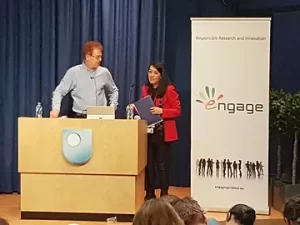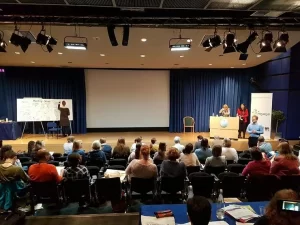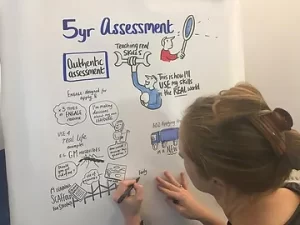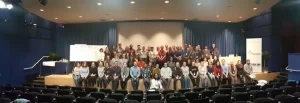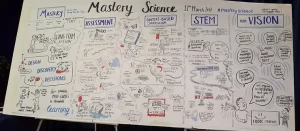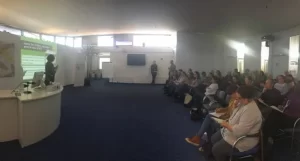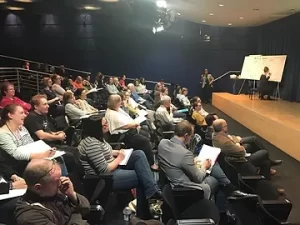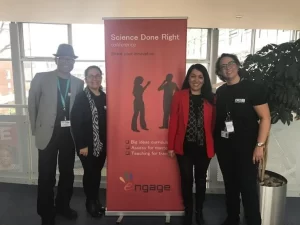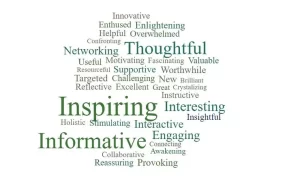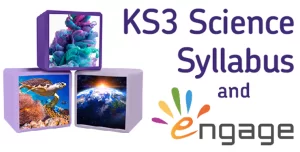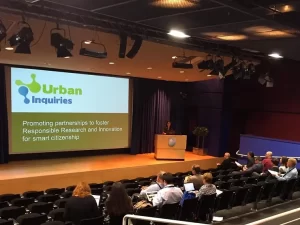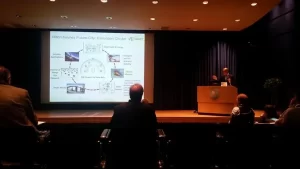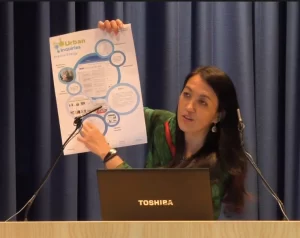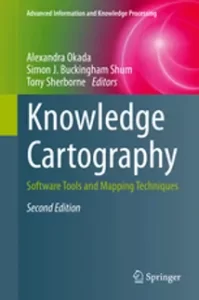Welcome to WordPress. This is your first post. Edit or delete it, then start writing!
Category Archives: All Posts
Responsible Research and Innovation in Action
Alexandra Okada, Wednesday 23 November 2016
The conference “Responsible Research and Innovation (RRI) IN ACTION,” organised by the RRI Tools project and supported by the European Commission, was held in Brussels on the 21st – 22nd of November 2016. This event brought together 200 experts in the field to discuss open science and innovation systems that tackle the societal challenges of our world.
RRI IN ACTION engaged a full range of R&I stakeholders: researchers and research organisations, policymakers at global, European, national, and regional levels, business and industry representatives, science education members, and civil society organisations.
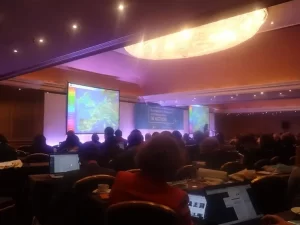
During this event, various relevant questions were discussed: What are the key impacts of RRI projects for academia, business, and society? What have RRI projects achieved so far? Is our research work addressing social-scientific issues that are significant for society? What are the consequences of projectification? How are we equipping the next generation for RRI? How are the RRI best practices influencing policy? What are the international perspectives on responsibility and innovation? What is next? What is beyond the H2020?
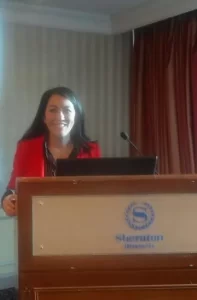
Ale Okada, the technical coordinator of the European project ENGAGE, invited as a speaker, presented various outcomes of the project and its impact in EDUCATION. ENGAGE developed a wide community of more than 12,000 teachers in 80 countries, 30 Open Educational resources on topical science, and 3 Massive Open Online Courses translated into 10 languages. It also created a significant RRI curriculum that connects science with societal issues, needs, and concerns, along with 10 inquiry skills for equipping youth for RRI linked to the AQA national exam board. Furthermore, 6 pedagogical tools for educators to embed RRI in the classroom, and various best practices at the local, national, and transnational levels were discussed. During the conference, Okada also discussed with the participants the outcomes of the research on the mapping technology “LiteMap“ for RRI, which has been used by the ENGAGE community (researchers, teachers, and students) for two years in Europe and Brazil.
More than 45 projects were presented on various key issues: public engagement with science, gender equality, open access, ethics and research integrity, and science education. The event was a fantastic opportunity to collaboratively envision the next steps of Responsible Research and Innovation in Education, including in terms of impact, policy, and funding opportunities. The event ended with a nice proverb: “If you want to go fast – go alone, if you want to go far – go together.”
ENGAGE wins the 2017 OER & Project Awards for Open Education Excellence!
Alexandra Okada, Monday 20 February 2017
ENGAGE is a winner of the 2017 OER & Project Awards for Open Education Excellence, which was announced by the global network of Open Education (OEC). Fourteen partners and more than 15,000 open educators in 80 countries, who are members of ENGAGE, are celebrating this award now. The ceremony will be presented at the upcoming OEC Global Conference in Cape Town, South Africa, March 08-10, 2017.
Dr. Okada highlights that the award was made in recognition of a new approach to Open Science Education which promotes Responsible Research and Innovation (RRI). The term RRI, created by the European Commission, refers to the participatory process that aligns scientific innovations to societal needs and expectations. She has just announced to the ENGAGE team that “We are officially leading creative innovations for Science Education to empower teachers through OER and MOOC for equipping the next generation for RRI by connecting non-formal resources (topical science-in-the-news) and informal learning (science networks) with formal education (science curriculum).
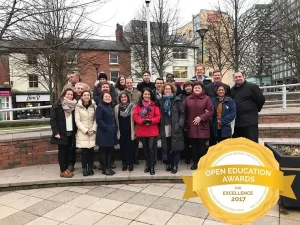
The ENGAGE project funded by the European Commission links available knowledge outside the classroom, such as science media that has an impact on citizens’ lives, to create controversial socio-scientific dilemmas that hook learners’ curiosity and their “need to know” in the school. Students think, talk, and develop informed-based views using science connected to their life while interacting with scientists. Through OER and guidelines, teachers support them with 10 inquiry skills for RRI, which are grouped into four areas: inquire, analyze, solve, and communicate. This framework was adopted by the UK national exam board AQA for assessment.
ENGAGE presents a new way of thinking and substantially improves the discoverability, presentation, usability, accessibility, and availability of openness in science education for RRI. It offers contemporary learning materials for students, guidelines for teaching, and open online courses in the OpenEdx MOOC platform for all educators, all under Creative Commons license in 10 languages.
A key challenge in Science Education, which ENGAGE was designed to tackle “for promoting critical scientific literacy, and for learning about science, scientists, scientific inquiry, and scientific argumentation, is the need to furnish students with the knowledge, skills, and attitudes to address socio-scientific and environmental issues in a critical way and to reach informed decisions on a range of science-related and technology-related issues that impact them, their immediate family and friends, the surrounding local, national, and global community, and the planet as a whole (Hodson).
ENGAGE researchers are taking into account possible gender and geographical differences in Europe, including also the analysis of projects developed by socio-economically disadvantaged groups in remote areas of Brazil and Africa. Various studies in Brazil, Lithuania, Spain, and Romania use the LiteMap tool for collaborative argumentative visualization developed in KMi. New interdisciplinary research about children’s health and wellbeing in the UK and Brazil is currently in development based on ENGAGE materials related to ZIKA virus, Vitamin D, Sugary Drinks, e-Cigarettes, and Text neck (smartphones).
The ENGAGE team led by Dr. Sherborne elaborated more than 30 OERs based on contemporary science linked to various topics: Earth, Ecosystem, Electromagnetism, Energy, Forces, Genes, Matter, Organisms, Reactions, and Waves. Dr. Okada coordinated a MOOC on pedagogical tools and inquiry skills for RRI for pre-service and in-service teachers, delivered by 11 partners, and co-authored a course book, various research papers, and policy reports. Currently, the ENGAGE portal has more than 3,500 comments, 130,000 downloads, and 675,000 views.
ENGAGE Team, well done!
Related Links:
Developing a study about VR 360 Brazil UK
Today, Dr. Simone Fuchter from UNISUL – University in Brazil visited the Open University / LTI to develop a study about VR 360 with the research group of Dr. Okada.
This VR research focuses on the APP Virtual classroom developed with 360 video and Unit 3D together.
The app was used by students at Unisul Brazil and The OU UK. Findings will be published in a journal paper.
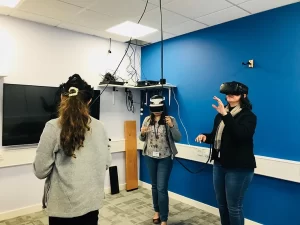
The preliminary study was presented at the IED conference on Immersive Education in Lucca.
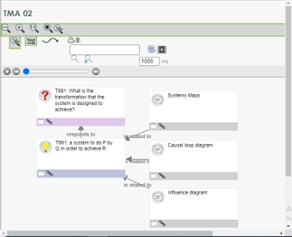
Ginga Brazil presents their digital swing at the Open University UK
Prof. Dr. André Barbosa, Research Coordinator and counsellor at the IBICT, Head of the GINGA project, talked at the Open University UK about the Digital TV with Internet connection for the low-income population in Brazil.
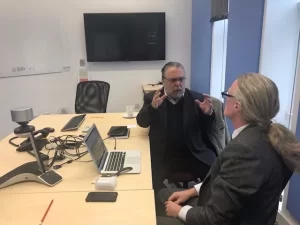
Ginga® is the middleware of the Japanese-Brazilian Digital TV System (ISDB-TB) and ITU-T Recommendation for IPTV services. Ginga is made up of a set of standardized technologies. Ginga allows the broadcasters to send applications with interactive content to the audience, facilitating integration with the internet and expanding its usage possibilities. More than 15 million televisions were integrated into the Ginga network.
Dr. Barbosa also discussed opportunities for partnerships with Brazilian Universities for educational and professional development at scale in Brazil through online courses using the OpenLearn Create platform developed at the Open Media of the OU.
Testing thinglink iphone 7 wix site
An inspiring conference for the majority of science educators
Alexandra Okada, Thursday 16 March 2017
The ENGAGE project conference, at the Open University on March 11th, was a unique event designed to launch a community of innovative science teachers. Funded by the European Commission (EC), this event brought together more than 80 Science teachers from right across England, as well as Russia and Brazil.
The conference themes were chosen by the teachers themselves, who presented their innovative classroom practice on curriculum, assessment, and teaching methods. “Overall the event was excellent, inspiring, and very informative. I enjoyed presenting. I would be happy to present again next year. I enjoyed networking with colleagues from around the country.” Rowan Mangier, Science Teacher. “Teachers were so very grateful to have the opportunity to discuss ideas and strategies with other teachers and hear solutions to the problems they are encountering” Jude Sanders, facilitator.
Ale Okada, the legacy and technical coordinator of ENGAGE, opened the conference with the key outcomes of this European project: an open science education portal, including OER and MOOC in 10 languages for equipping students to make decisions using science; a relevant framework to foster 10 inquiry skills for Responsible Research and Innovation (RRI); and an international community of science teachers with 18,043 members interested in topical science.
She highlighted that RRI is one of the key areas created by the EC for promoting science with and for society. “This is exactly our aim: to empower students supported by teachers to take an active role and voice their informed views and concerns on socio-scientific issues that are relevant for their lives and society.”
The keynotes Tony Sherborne, scientific leader of ENGAGE, and Stella Paes, Head of science at AQA presented important questions and reflections on Science Education: “How can the Science Education curriculum be reshaped so that it’s more fit for purpose?” and “How can an approach focused on examination success still lead to an enlightened science education?”
The workshops on a 5-year plan and assessment, including ENGAGE resources, were also considered very thoughtful for several teachers who mentioned that there was a sense of relief that they could finally see ‘proof’ that their hunch that there was just not enough teaching time was a valid criticism to take to senior leadership. There was too much content to teach across the 5 years, so teachers should focus on teaching the core well rather than covering everything badly.
“ENGAGE project is very relevant to attract teachers and students across the world. Its content and strategies are very relevant for secondary schools and it should be also extended to primary education” Marianne Cuttler – the head of the Association for Science Education in the UK. “It was very useful to talk to teachers in the UK to know how they used ENGAGE. Our students in Bahia were really engaged with topical socio-scientific dilemmas, including innovative resources to develop scientific argumentation.” Ana Karine Rocha, Sonia Pinto, and Silvar Ribeiro – Teachers from Salvador Brazil.
“I came away from the conference very proud of the work we have done over the years! It was great to meet so many teachers who like what we do and want more.” Gemma Young, ENGAGE resources developer and KMi research visitor.
Indeed, it is really significant for us to see the impact of ENGAGE in the UK and across the world.
Related Links:
Be interesting. It’s on the Syllabus.
Alexandra Okada, Monday 14 December 2015
Syllabuses in science are not known for being interesting. They are typically shopping lists, itemising every fact and concept. The problem is, with all those items to check off, teachers spend most of their time drilling kids’ heads full of content instead of filling them with enthusiasm.
The new KS3 Science Syllabus from AQA is different. Jointly developed by the Open University (KMi)’s ENGAGE project for the European Commission, it’s a blueprint for a different kind of science teaching. Students have time to explore real-life controversial issues that affect their lives now, from genetics to climate change.
Our breakthrough design has two special ingredients, which reduce the content teachers need to cover, and show them how to put science in context. First are Big Ideas. Instead of presenting science as a list of facts and concepts, our Syllabus sets it out as a set of principles and theories that have changed our view of the universe and ourselves. By reorganising the stuff in the National Curriculum around these 10 big ideas, we slashed the content by half. Teachers can now see what their students really need to know.
Our second ingredient is a new section in each topic – Apply. Syllabuses usually just define knowledge, which is strange because applying what you know to new situations is what we really want students to be able to do. The KS3 Science Syllabus sets out in black and white the ways we want students to be able to use their knowledge – including the real-life science students want to learn about.
And this is where ENGAGE fits in – making it easy for teachers to introduce science-in-news issues into the classroom. So instead of just studying burning and writing equations, the Syllabus asks students to think about the applications, and ENGAGE provides a lesson on the Diesel scandal. Students learn the chemistry by studying a diesel engine and wondering whether it’s a good idea to buy Diesel or not.
4000 UK science teachers already come to ENGAGE when they want to turn a conventional lesson into a provocative dilemma for students to solve. Now that these are on the syllabus, we hope these will become a regular part of students’ diets, and help to make learning science the exciting experience it should be.
Related Links:
Promoting Partnerships among Universities, Schools, and Research Centers for Smart Citizenship
Alexandra Okada, Wednesday 17 June 2015
The Open University hosted the 15th International Conference on Technology Policy and Innovation (ICTPI) on 17-19 June 2015. ICTPI’15 conference brought together leading representatives of academic, business, and government sectors worldwide to present and discuss current and future issues of using science and technology.
The theme of ICTPI 2015 focuses on ‘ICT and Science in a Complex World’. This event attracted a large audience interested in: Education Futures, Smart Cities, New Economy, Data Security, Energy, and MK: Enterprise Growth. Professor Enrico Motta presented the project MK:Smart, including ‘MK Data Hub’, which supports the acquisition and management of vast amounts of data relevant to city systems from a variety of data sources. Annika Wolff gave a talk on ‘Bringing Smart City Data Skills to Schools’ as part of the MK:smart project.
Ale Okada introduced the project Urban Inquiries, which is based on various international and national projects. It applies pedagogical approaches such as scientific dilemmas (ENGAGE), data inquiry (MK: Smart), and inquiry-based learning technologies (weSPOT, LiteMap, and nQuire-it). Urban Inquiries aim to support educators and learners to develop authentic inquiry-based projects and promote Responsible Research and Innovation. She also presented the paper developed with Annika Wolff and Alex Mikroyannidis: ‘Promoting partnerships among Universities, schools, and research centres to foster Responsible Research and Innovation for smart citizenship’.
This pilot research discusses three ‘urban inquiries’ projects on: Energy Consumption, Electric Cars, and Solar panels, which were developed by Stantonbury School. This study indicated evidence of co-inquiry-based learning focused on the collaborative construction of scientific questions. It showed how Personal Learning Environments supported young smart learners to develop collective inquiry and share outcomes. Secondary pupils co-authored 3 videos, 3 posters for an international conference, and 1 conference presentation through ‘urban inquiries’.
Urban Inquiries, RRI and Partnerships from Alexandra Okada
Related Links:
15th International Conference on Technology Policy and Innovation (ICTPI)
ENGAGE – inquiry-based learning OER
The second edition of the top 10 book – Knowledge Cartography is now available!
Alexandra Okada, Wednesday 03 December 2014
We are delighted to announce that the second edition of the book Knowledge Cartography: Software Tools and Mapping Techniques has been published this month with five new chapters. The aim of this book is to present how mapping techniques and software tools can be used for learning, teaching, and knowledge management.
The readers will find 540 pages with all the maps and images in color presenting the current state-of-the-art in the field. This pioneer book in the area of Knowledge Cartography includes 22 chapters from 45 leading researchers and renowned practitioners. Learners will find new perspectives and tools to expand their visual thinking repertoire, while researchers will find rich enough conceptual grounding for further scholarship.
The book presents six chapters about OU research work, four European projects: OpenLearn, Engage, weSPOT, and Catalyst, and three KMi tools: Compendium, Cohere, and LiteMap. Dr. Anna de Liddo, co-author and head of the collective intelligence group in KMI, suggests this book to learners, educators, and researchers in all disciplines, as well as policy analysts, scenario planners, knowledge managers, team facilitators, and research project coordinators.
Ale Okada, chief editor, highlights that it was a great experience for her to bring together renowned authors, practitioners, and learners from across the world in various areas and diverse range of mapping techniques.
“Various pioneers in mapping techniques and tools each authored a chapter. The book also includes innovative case studies developed by my students. We are now in the decade of BIG DATA. Knowledge mapping, therefore, became more relevant as a key skill for this digital age – useful in various fields for visualization, sensemaking, management, and collective intelligence. It is really fruitful to see that this book has been helping lots of new PhD students, educators, research groups, and technologists. It has also been an important reference for various funded research projects”.
The first edition of this book was one of the top most downloaded eBooks in the Springer Collection. We think that the second edition will be popular too.
Current funded projects in KMi, which include mapping techniques:
In Education led by Dr. Okada:
WeSPOT
ENGAGE
In Collective Intelligence led by Dr. DeLiddo:
Catalyst
EDV
The book is also available at the Open University Library soon!
Okada, A., Buckingham Shum, S. and Sherborne, T. (2014) Knowledge Cartography: Software Tools and Mapping Techniques. London: Springer Verlag.
See more at: http://www.springer.com/computer/hci/book/978-1-4471-6469-2

